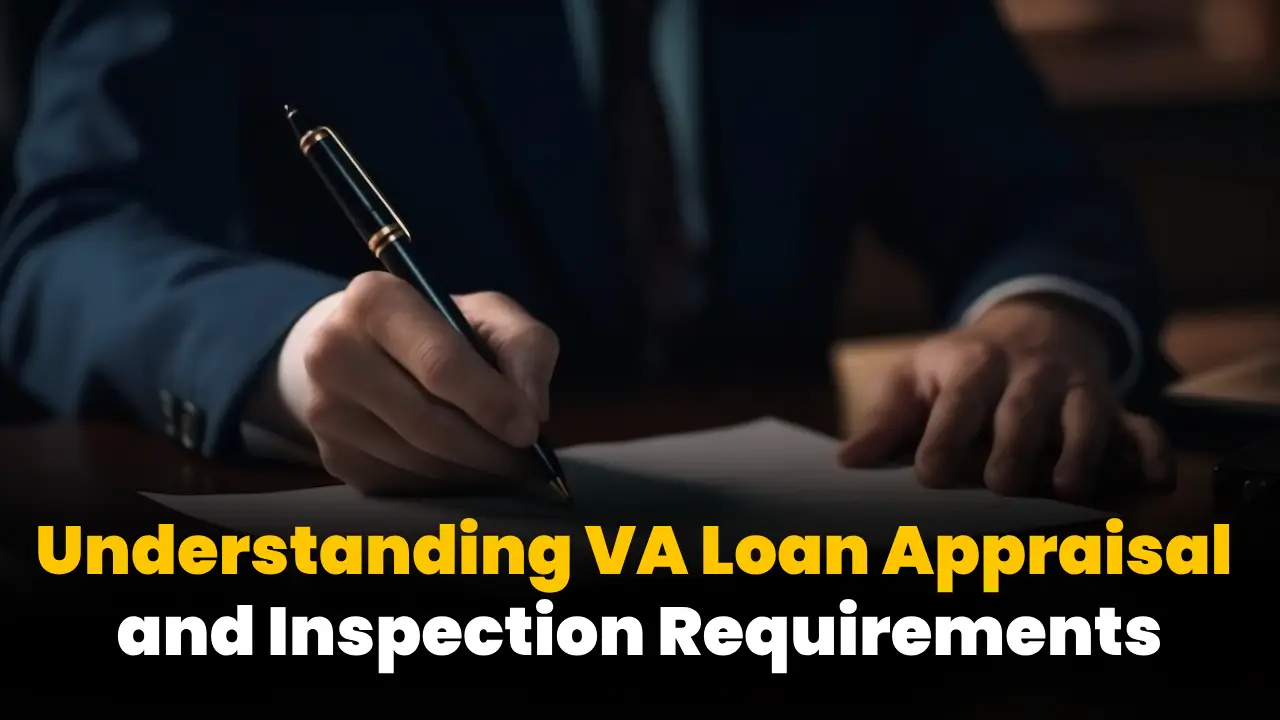Are you considering applying for a VA loan to purchase a home? It’s crucial to understand the VA loan appraisal and inspection requirements to ensure a smooth and successful home buying process. Veterans and eligible service members can take advantage of this unique loan program offered by the U.S. Department of Veterans Affairs (VA), which provides favorable terms and benefits. Let’s delve into the specifics of VA loan appraisal and inspection guidelines to help you navigate this process effectively.
VA Loan Appraisal Requirements
Objective Valuation: The primary purpose of a VA appraisal is to determine the fair market value of the property. The VA appraisal ensures that the property’s value aligns with the loan amount and that veterans are not overpaying for the property.
VA Appraiser Selection: The VA assigns a VA-approved appraiser to conduct the appraisal. These appraisers are well-versed in VA appraisal standards and guidelines. Borrowers cannot choose their appraiser.
Property Eligibility: The property being appraised must meet minimum VA property requirements (MPRs). These requirements ensure that the property is safe, sanitary, and structurally sound. The property should also be residential in nature and suitable for living purposes.
Physical Inspection: A comprehensive physical inspection of the property is conducted to identify any deficiencies or safety concerns. This includes checking the foundation, roof, plumbing, electrical systems, and more.
Minimum Property Requirements (MPRs): Some MPRs include functioning heating systems, safe water supply, secure roofing, and proper ventilation. Properties with significant issues may need repairs before the loan can be approved.
Termite Inspection: In certain areas with prevalent termite activity, a termite inspection may be required to ensure the property is free from termite-related damage.
Read More: Unraveling Upfront Mortgage Insurance Premiums (UFMIPs) in the Mortgage Landscape
VA Loan Inspection Requirements
Private Inspections: While the VA appraisal is focused on the property’s value and condition, veterans are encouraged to get additional private home inspections. These inspections offer a more detailed assessment of the property’s structural integrity and systems.
Types of Inspections: Veterans can choose to get inspections related to specific aspects of the property, such as plumbing, electrical systems, roof, foundation, and more. These inspections provide a deeper understanding of the property’s overall condition.
Educational Process: The VA emphasizes educating borrowers about the importance of private inspections. Veterans are informed that these inspections are optional but highly recommended to ensure they are making an informed purchase.
VA Appraisal vs. home inspection
VA Appraisal vs. Home Inspection: Key Differences
VA Appraisal
- Purpose: Determines property value for loan approval.
- Ordered by: VA assigns an appraiser.
- Focus: Property’s value and condition relative to loan amount.
- Property Eligibility: Must meet Minimum Property Requirements (MPRs).
- Scope: Checks for structural soundness, safety, and basic living conditions.
- Termite Inspection: Required in termite-prone areas.
- Appraiser Qualifications: VA-approved appraisers with knowledge of VA standards.
- Cost: Typically paid by the buyer or seller.
- Result Impact: May affect loan approval and amount.
- Borrower Choice: Cannot choose the appraiser.
Home Inspection
- Purpose: Evaluates overall property condition for buyer’s knowledge.
- Ordered by: Buyer chooses a private inspector.
- Focus: In-depth assessment of property’s systems and structure.
- Property Eligibility: N/A, focuses on buyer awareness.
- Scope: Identifies potential issues and needed repairs.
- Termite Inspection: Optional, but separate from standard inspection.
- Inspector Qualifications: Licensed home inspectors with relevant expertise.
- Cost: Paid by the buyer.
- Result Impact: Helps buyers make informed decisions and negotiate repairs.
- Borrower Choice: Can select their preferred inspector.
In summary, a VA appraisal primarily ensures the property’s value aligns with the loan amount and meets VA standards, while a home inspection offers a detailed assessment of the property’s condition, helping buyers make informed decisions and potentially negotiate repairs. Both processes serve different purposes in the home buying journey.
VA septic inspection requirements
- Mandatory in certain cases
- Ensures septic system’s functionality
- Required when public sewer unavailable
- Inspection by qualified professional
- Evaluates system’s condition
- Checks for leaks and backups
- Verifies compliance with local codes
- May necessitate repairs or replacement
- Ensures safe and sanitary conditions
- Supports property’s overall value
VA loan minimum property Requirements (MPRs)
- Safe drinking water availability
- Functioning heating system
- Secure roofing
- Structurally sound foundation
- Properly working electrical systems
- Good ventilation
- Adequate living space
- Proper drainage
- Pest-free living conditions
- Safe access to the property
- Satisfactory property grading
- Well-maintained exterior
- Compliance with local zoning laws
- No hazardous materials presence
What to do about problems with the VA Appraisal
If you encounter issues with the VA appraisal, communicate with your lender. They can provide guidance on how to address discrepancies. You can also provide additional information or request a reconsideration if you believe the appraisal was inaccurate.
FAQ’s
What are the 2 types of VA Appraisal?
The two types of VA appraisals are the “VA Appraiser Panel” appraisal, conducted by VA-approved appraisers, and the “Second-Tier Review” appraisal, performed when issues arise with the first appraisal.
Is an appraisal required with a VA loan?
Yes, an appraisal is required with a VA loan to determine the property’s value and ensure it meets the VA’s Minimum Property Requirements (MPRs).
How does the VA Determine Appraisal value?
The VA determines appraisal value by considering recent sales of similar properties in the area, property condition, and market trends, ensuring a fair and reasonable value assessment.
The Bottom Line
understanding VA loan appraisal and inspection requirements is vital for a successful home buying journey. Adhering to these standards ensures property value alignment, safety, and informed decision-making, benefiting both veterans and eligible service members.
Read More: Bank of Canada’s Minutes Reveal Deliberate Emphasis on Hawkish Stance Following Recent Rate Decision







